|
| |
Quotes
These men knew what they
meant and meant what they said!
This Page Last Updated 10/13/2015
Not an NRA Member? Shame on you!
We would not even be having this conversation
on the topic of gun rights in America if it wasn't for the hard work and
dedication of the National Rifle Association. You say that you don't have
the money??? An Associate Membership (no magazine) is just $10.00 per
year, that's less than three cents (-$0.03) each day. Before you do
anything else, do your duty and support the NRA through your membership. JOIN
THE NRA TODAY. You can save $10.00 on a regular annual membership by
using the link I've just provided, making it just $25.00. JOIN
TODAY.
"Quemadmoeum
gladis nemeinum occidit,
occidentis telum _est" ("A sword is never a killer, it's a tool
in the killer's hands")
Lucius Annaeus Seneca
"the younger" ca. (4 BC - 65 AD)
"And they are ignorant that the purpose of the sword is to save every man from slavery."
Marcus Annaeus Lucanus Roman poet (A.D. 39-65)
Source: De Bello Civili (Cambridge: Harvard University Press, Loeb Classical Library, 1988), IV, 579, p. 216
"There exists a law, not written down anywhere, but in our hearts; a law which comes to us not by training or custom or reading; a law which has come to us not from theory but from practice; not by instruction but by natural intuition: I refer to the law which lays it down that, if our lives are endangered by plots or violence or armed robbers or enemies, any and every method of protecting ourselves is morally right."
Marcus Tullius Cicero (106 BC-43 BC) Roman Orator and Statesman at the trial of T. Annius Milo in 52 BC
"A nation can survive its fools, and even the ambitious. But it cannot survive treason from within. An enemy at the gates is less formidable, for he is known and carries his banner openly. But the traitor moves amongst those within the gate freely, his sly whispers rustling through all the alleys, heard in the very halls of government itself. For the traitor appears not a traitor; he speaks in accents familiar to his victims, and he wears their face and their arguments, he appeals to the baseness that lies deep in the hearts of all men. He rots the soul of a nation, he works secretly and unknown in the night to undermine the pillars of the city, he infects the body politic so that it can no longer resist. A murderer is less to fear. The traitor is the plague."
Marcus Tullius Cicero (106-43 B.C.) Roman Statesman, Philosopher and Orator
Source: Attributed. 58 BC, Speech in the Roman Senate
"It is a just person who disobeys an unjust law."
Plato (427-347 BC)
"Tyranny
derives from the oligarchy's mistrust of the people; hence they deprive
them of arms, ill-treat the lower class, and keep them from residing in
the capital. These are common to oligarchy and tyranny."
Aristotle in Politics (J.
Sinclair translation, pg. 218, 1962)
"It is
also in the interests of a tyrant to keep his people poor, so that they
may not be able to afford the cost of protecting themselves by arms and be
so occupied with their daily tasks that they have no time for
rebellion."
Aristotle in Politics (J.
Sinclair translation, pg. 226, 1962)
"I would rather
be exposed to the inconveniences attending too much liberty than to those
attending too small a degree of it."
Thomas Jefferson, letter to
Archibald Stuart, Philadelphia, December 23, 1791; “The Works of Thomas
Jefferson,” Federal Edition (New York and London, G.P. Putnam’s Sons,
1904-5) Vol. 6
"Honor,
justice, and humanity, forbid us tamely to surrender that freedom which we
received from our gallant ancestors, and which our innocent posterity have
a right to receive from us."
Thomas Jefferson (Declaration of the Causes and Necessities of Taking up Arms, 6 July 1775)
"It does not take a majority to prevail ... but rather an irate, tireless minority, keen on setting brushfires of freedom in the minds of men."
Samuel Adams "The Father
of the American Revolution"
"The right of
self-defense never ceases. It is among the most sacred, and alike
necessary to nations and to individuals."
President James Monroe (November 16,
1818)
"Any single man
must judge for himself whether circumstances warrant obedience or resistance to
the commands of the civil magistrate; we are all qualified, entitled, and
morally obliged to evaluate the conduct of our rulers. This political
judgment, moreover, is not simply or primarily a right, but like
self-preservation, a duty to God. As such it is a judgment that men cannot
part with according to the God of Nature. It is the first and foremost of
our inalienable rights without which we can preserve no other."
John Locke (1632-1704) English
philosopher and political theorist.
"We may be tossed upon an ocean
where we can see no land nor, perhaps, the sun and stars. But there is a chart
and a compass for us to study, to consult, and to obey. The chart is the
Constitution."
Daniel Webster
(1782-1852) American Statesman, U.S. Senator and Secretary of State under
three (3) U.S. Presidents
If we are to ever get to the bottom of the argument
surrounding the Right To Keep And Bear Arms (RKBA), then we must go back in time
and see what the founders said.
Some people, including the
ACLU, have asserted that the Second Amendment only protects a state's power to
raise and support an armed militia. I have the feeling that if the
Founding Father's were alive today, they would have something to say about
that...
When you are finished reading
this page, I guarantee you will say to yourself, hey Marc really knows what he
is talking about.
I have done entirely enough
talking now and I will let the rest of this page speak for the Founding
Father's. Let's go back in time and see what they had to say...
"On every question of construction (of the Constitution) let us carry ourselves back to the time when the Constitution was adopted, recollect the spirit manifested in the debates, and instead of trying what meaning may be squeezed out of the text, or invent against it, conform to the probable one in which it was passed."
Thomas Jefferson letter
to Justice William Johnson, June 12, 1823
Many millions of United States Citizens believe that the
Second Amendment ONLY refers
to each State's power to form militias. This is simply not the case.
The Second Amendment does indeed refer to the right to keep and bear arms as an
individual right.
When the Second Amendment was written,
there wasn't any National Guard. The People were the National Guard.
In fact, the National Guard did not exist for
another 116 years.
Private Firearm ownership is a
guarantee against the breaching or transgression of all the other rights
reserved to the People. Private and free gun ownership is a guard against
any possible tyranny or dictatorships. The Founding Fathers knew what they
meant and meant what they wrote.
The Founding Fathers clearly did not
believe that limiting lawful access to firearms by law-abiding, honest and
upright citizens of good moral character would either diminish crime, nor be
constitutional.
When considering ANY legislation that
has the slightest hint of curtailing our freedom and liberty, we should closely
examine it as if it was taken to the most extreme limit, then treat it
accordingly.
"You
[should] not examine legislation in the light of the benefits it will
convey if properly administered, but in the light of the wrongs it would
do and the harm it would cause if improperly administered."
Lyndon B. Johnson (1908-1973)
37th US President (1963-1969)
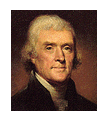
"I hope, therefore, a bill of rights will be
formed to guard the people against the Federal government as they are
already guarded against their State governments, in most instances."
Thomas Jefferson to James Madison,
1788
"I learn with great concern that [one] portion of our frontier so interesting, so important, and so exposed, should be so entirely unprovided with common fire-arms.
I did not suppose any part of the United States so destitute of what is considered as among the first necessaries of a farm house."
Thomas Jefferson, Letter to Jacob
J. Brown (1808)
"Laws that
forbid the carrying of arms disarm only those who are neither inclined
nor determined to commit crimes. Such laws make things worse for the
assaulted and better for the assailants; they serve rather to encourage
than to prevent homicides, for an unarmed man may be attacked with greater
confidence than an armed man."
Thomas Jefferson
This quote is from Jefferson's "Legal Commonplace Book" and is
actually Jefferson including a quote from Cesare Beccaria's Essay on Crimes and Punishments,
as Jefferson was a big fan of Beccaria.
"Honor,
justice, and humanity, forbid us tamely to surrender that freedom which we
received from our gallant ancestors, and which our innocent posterity have
a right to receive from us. We cannot endure the infamy and guilt of
resigning succeeding generations to that wretchedness which inevitably
awaits them if we basely entail hereditary bondage on them."
Thomas Jefferson (Declaration of the Causes and Necessities of Taking up Arms, 6 July 1775)
"I have sworn upon the altar of God eternal hostility
against every form of tyranny over the mind of man."
Thomas Jefferson
"Every citizen should be a soldier.
This was the case with the Greeks and Romans, and must be that of every free state."
Thomas Jefferson (1743-1826), US Founding Father, drafted the Declaration of Independence, 3rd US President
"The
constitutions of most of our states (and of the United States) assert that
all power is inherent in the people; that they may exercise it by
themselves; that it is their right and duty to be at all times armed; that
they are entitled to freedom of person, freedom of religion, freedom of
property and freedom of the press."
Thomas Jefferson
(1743-1826), US Founding Father, drafted the Declaration of Independence,
3rd US President
Source a letter from Thomas Jefferson to John Cartwright in 1824
"One loves
to possess arms, though they hope never to have occasion for them."
Thomas Jefferson Letter to
George Washington, 1796
"No free man shall ever be debarred the use of
arms."
Thomas Jefferson, Proposed Virginia Constitution, 1776
"For a
people who are free, and who mean to remain so, a well organized and armed
militia is their best security."
Thomas Jefferson (1743-1826),
US Founding Father, drafted the Declaration of Independence, 3rd US
President. Source: Eighth Annual Message, November 8, 1808
"None but an armed nation can dispense with a standing army.
To keep ours armed and disciplined is therefore at all times important."
Thomas Jefferson 1803
"When governments fear the people, there is liberty. When the people fear the government, there is tyranny.
The strongest reason for the people to retain the right to keep and bear arms is, as a last resort, to protect themselves against tyranny in government."
Thomas Jefferson
(attributed without source)
"A strong body makes the mind strong. As to the
species of exercise, I advise the gun. While this gives moderate exercise to the
body, it gives boldness, enterprise and independence to the mind. Games played
with the ball and others of that nature are too violent for the body and stamp
no character on the mind. Let your gun therefore be the constant companion of
your walks."
Thomas Jefferson's advice to his 15 year-old
nephew Peter Carr 1785
"God forbid we should ever be twenty years without such
a rebellion.... And what country can preserve its liberties, if its rulers are
not warned from time to time, that this people preserve the spirit of
resistance? Let them take arms.... The tree of liberty must be refreshed from
time to time with the blood of patriots and tyrants. It is its natural
manure."
Thomas Jefferson, letter to William Stephens Smith, November 13, 1787; “The Works of Thomas Jefferson,” Federal Edition (New York and London, G.P. Putnam’s Sons, 1904-5) Vol. 5
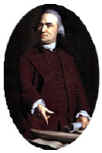
"Let us
contemplate our forefathers and posterity and resolve to maintain the
rights bequeathed to us from the former, for the sake of the latter. The
necessity of the times, more than ever, calls for our utmost
circumspection, deliberation, fortitude, and perseverance. Let us remember
that 'if we suffer tamely a lawless attack upon our liberty, we encourage
it, and involve others in our doom.' It is a very serious consideration
that millions yet unborn may be the miserable sharers of the event."
Samuel Adams speech, 1771
"Among the natural rights of the colonists are these: first, a right
to life, secondly to liberty, thirdly to property; together with the right to
defend them in the best manner they can."
Samuel Adams
"[T]he
people alone have an incontestable, unalienable, and indefeasible right to
institute government and to reform, alter, or totally change the same when
their protection, safety, prosperity, and happiness require it."
Samuel Adams
"...It is always dangerous to the liberties of the people
to have an army stationed among them, over which they have no control...The
Militia is composed of free Citizens. There is therefore no danger of
their making use of their power to the destruction of their own Rights, or
suffering others to invade them."
Samuel Adams
"If ye
love wealth better than liberty, the tranquility of servitude better than
the animating contest of freedom, go home from us in peace. We ask
not your counsels or arms. Crouch down and lick the hands which feed
you. May your chains set lightly upon you, and may posterity forget
that ye were our countrymen."
Samuel Adams, speech at the
Philadelphia State House, August 1, 1776.
"The said Constitution [shall] be never construed to
authorize Congress to infringe the just liberty of the press, or the rights of
conscience; or to prevent the people of the United States, who are peaceable
citizens, from keeping their own arms."
Samuel Adams of Massachusetts -- U.S. Constitution ratification convention,
1788

"Besides
the advantage of being armed, which the Americans possess over the people
of almost every other nation... Notwithstanding the military
establishments in the several kingdoms of Europe, which are carried as far
as the public resources will bear, the governments are afraid to trust the
people with arms."
James Madison, Federalist
Papers, #46 at 243-244.
"Do not
separate text from historical background. If you do, you will have
perverted and subverted the Constitution, which can only end in a
distorted, bastardized form of illegitimate government."
James Madison (1751-1836),
Father of the Constitution for the USA, 4th US President
"The truth is
that all men having power ought to be mistrusted."
James Madison
(1751-1836) As quoted in The Great Quotations (1960) by George Seldes, p. 460
"The highest number to which, according to the best
computation, a standing army can be carried in any country, does not exceed one
hundredth part of the whole number of souls; or one twenty-fifth part of the
number able to bear arms. This proportion would not yield, in the United States,
an army of more than twenty-five or thirty thousand men. To these would be
opposed a militia amounting to near half a million of citizens with arms in
their hands, officered by men chosen from among themselves, fighting for their
common liberties, and united and conducted by governments possessing their
affections and confidence. It may well be doubted, whether a militia thus
circumstanced could ever be conquered by such a proportion of regular troops."
James
Madison, The Federalist Number 46 January 29, 1788
"Besides
the advantage of being armed, which the Americans possess over the people
of almost every other nation, the existence of subordinate governments, to
which the people are attached and by which the militia officers are
appointed, forms a barrier against the enterprises of ambition, more
insurmountable than any which a simple government of any form can admit
of."
James Madison, The Federalist
No. 48, February 1, 1788
"The right of the people to keep and bear arms shall not be
infringed; a well armed, and well regulated militia being the best security of a
free country: but no person religiously scrupulous of bearing arms, shall be
compelled to render military service in person."
James Madison,
Proposed Amendments to the Constitution June 8, 1789
"Suppose that we let a regular army, fully equal to the resources of the country, be formed; and let it be entirely at the devotion of the federal: still it would not be going to far to say that the State governments with the people at their side would be able to repel the danger...half a million citizens with arms in their hands"
James Madison, The Federalist Papers
"A well regulated militia, composed of the body of the
people, trained to arms, is the best and most natural defense of a free
country."
James Madison (1751-1836),
Father of the Constitution for the USA, 4th US President
"A people
armed and free forms a barrier against the enterprises of ambition and is a bulwark for
the nation against foreign invasion and domestic oppression."
James Madison
(1751-1836), Father of the Constitution for the USA, 4th US President
"A
government resting on the minority is an aristocracy, not a republic, and
could not be safe with a numerical and physical force against it, without
a standing army, an enslaved press and a disarmed populace."
James Madison (1751-1836),
Father of the Constitution for the USA, 4th US President
Source: The Federalist No. 46.
"[Tyranny cannot be safe] without a standing army, an enslaved press, and a disarmed
populace."
James Madison, In his autobiography
"The accumulation of all powers, legislative, executive, and judiciary, in the same hands, whether of one, a few, or many, and whether hereditary, self-appointed, or elective, may justly be pronounced the very definition of tyranny."
James Madison
(1751-1836), Father of the Constitution for the USA, 4th US President
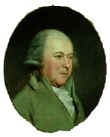
"To suppose arms in the hands of citizens, to be used at individual discretion, except in private self-defense, or by partial orders of towns, counties, or districts of a state, is to demolish every constitution, and lay the laws prostrate, so that liberty can be enjoyed by no man; it is a dissolution of the government. The fundamental law of the militia is, that it be created, directed, and commanded by the laws, and ever for the support of the laws."
John Adams (1735-1826)
Founding Father, 2nd US President A
Defense of the Constitution of Government of the United States of America, 1788
"You have rights antecedent to all earthly governments:
rights that cannot be repealed or restrained by human laws; rights derived from the Great Legislator of the universe."
John Adams (1735-1826) Founding Father, 2nd US President
"Facts are stubborn things; and whatever may be our wishes, our inclination, or the dictates of our passions,
they cannot alter the state of facts and evidence."
John Adams (1735-1826) Founding
Father, 2nd US President
"Our obligations to our country never cease but with our lives."
John Adams (1735-1826) Founding
Father, 2nd US President
"Resistance to
sudden violence, for the preservation not only of my person, my limbs and life,
but of my property, is an indisputable right of nature which I have never
surrendered to the public by the compact of society, and which perhaps, I could
not surrender if I would. Nor is there anything in the common law of England ...
inconsistent with that right."
John Adams(1735-1826) Founding
Father, 2nd US President
Source: BOSTON GAZETTE, September 5,
1763, The Works of John Adams, p.438 (Charles F. Adams ed., 1851).
"There is danger from all men.
The only maxim of a free government ought to be to trust no man living with
power to endanger the public liberty."
John Adams
(1735-1826) Founding Father, 2nd US President

"If the representatives of the people betray their constituents, there is no recourse left but in the exertion of that original right of self-defense which is paramount to all positive forms of government."
Alexander Hamilton Federalist
#28
"Let us
recollect that peace or war will not always be left to our option; that however
moderate or unambitious we may be, we cannot count upon the moderation, or hope
to extinguish the ambition of others. ...The best we can hope for concerning the
people at large is that they be properly armed."
Alexander Hamilton
(1757-1804) Source: the Federalist Papers at 184-8
"...but if circumstances
should at any time oblige the government to form an army of any
magnitude, that army can never be formidable to the liberties of the
people, while there is a large body of citizens, little if at all
inferior to them in discipline and use of arms, who stand ready to
defend their rights..."
Alexander Hamilton Federalist
29
"The project of disciplining all the militia of the United States is as futile as it would be injurious if it were capable of being carried into execution. A tolerable expertness in military movements is a business that requires time and practice. It is not a day, nor a week nor even a month, that will suffice for the attainment of it. To oblige the great body of the yeomanry and of the other classes of the citizens to be under arms for the purpose of going through military exercises and evolutions, as often as might be necessary to acquire the degree of perfection which would entitle them to the character of a well regulated militia, would be a real grievance to the people and a serious public inconvenience and loss."
Alexander Hamilton Federalist #29Webmaster's
Note: This quote by Hamilton sheds some much needed light on the term
'Well-Regulated' mentioned in the 2nd Amendment. It does not mean what it
does today, such as regulation through restrictive legislative activity.
It meant at the time that something would be working as it should, properly
calibrated and in good order.
"... of the liberty of conscience in matters of
religious faith, of speech and of the press; of the trial by jury of the
vicinage in civil and criminal cases; of the benefit of the writ of habeas
corpus; of the right to keep and bear arms.... If these rights are well
defined, and secured against encroachment, it is impossible that government
should ever degenerate into tyranny."
James Monroe
(1758-1831), 5th US President
"The right of
self-defense never ceases. It is among the most sacred, and alike
necessary to nations and to individuals."
President James Monroe (November 16,
1818)
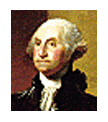
"A free people ought not only to be armed but disciplined; to which end a uniform and well digested plan is requisite: And their safety and interest require that they should promote such manufactories, as tend to render them independent on others, for essential, particularly for military supplies."
President George Washington First
Annual Message to Congress January 8, 1790
"To be prepared for war, is one of the most effectual means of preserving peace."
George Washington
"To each of my Nephews, William Augustine Washington, George
Lewis, George Steptoe Washington, Bushrod Washington, and Samuel Washington, I give one of my swords or Cutteaux of which I may be
Possessed; and they are to choose in the order they are named. These Swords are accompanied with an
injunction not to unsheathe them for the purpose of shedding blood, except it be for self defense,
or in the defense of their Country and its rights; and in the latter case, to keep them unsheathed, and prefer falling with
them in their hands, to the relinquishment thereof."
George Washington from his Last
Will and Testament
"The hour is fast approaching, on which the Honor and Success
of this army, and the safety of our bleeding Country depend. Remember officers and Soldiers, that you are Freemen, fighting
for the blessings of Liberty that slavery will be your portion, and that of your posterity, if you do not acquit yourselves like
men."
George Washington
"Altho' a large standing Army in time of Peace hath
ever been considered dangerous to the liberties of a Country, yet a few Troops,
under certain circumstances, are not only safe, but indispensably necessary.
Fortunately for us our relative situation requires but few. The same
circumstances which so effectually retarded, and in the end conspired to defeat
the attempts of Britain to subdue us, will now powerfully tend to render us
secure. Our distance from the European States in a great degree frees us
of apprehension, from their numerous regular forces and the Insults and dangers
which are to be dreaded from their Ambition."
George Washington May 1, 1783
"...As there is not the least doubt at present, that the
principle Object of the Enemy is to get Possession of the City of Philadelphia,
it is absolutely necessary, that every Person able to bear Arms (except such as
are Conscientiously scrupulous against it in every Case), should give their
personal Service, and whenever a part of the Militia is required only, either to
join the Army or find a Man in their place. In order to effect this, I beg you
will order the whole Militia of your State to be enrolled and compleatly
equipp'd; that one half at least may proceed to join the Army with all possible
expedition..."
George Washington--to Pennsylvania Safety Council, January 19, 1777

George Mason (1725-1792) Statesman, Founding Father, Patriot
and known as the "Father of the Bill of Rights"
"And we do each of us, for ourselves respectively, promise and engage to keep a good firelock in proper order, and to furnish ourselves as soon as possible with, and always keep by us, one pound of gunpowder, four pounds of lead, one dozen gunflints, and a pair of bullet moulds, with a cartouch box, or powder horn, and bag for balls."
George Mason's Fairfax County Militia Plan, 1775
"That a well-regulated militia, composed of the
body of the people, trained to arms, is the proper, natural and safe defense of
a free state; that standing armies, in time of peace, should be avoided as
dangerous to liberty; and that, in all cases, the military should be under
strict subordination to, and governed by, the civil power."
Virginia
Declaration of Rights 13 (June 12, 1776), drafted by George Mason
"I ask sir, what is the militia? It is the whole body
of the people except for a few public officials. To disarm the people is
the best and most effectual way to enslave them..."
George Mason (1725-1792),
drafted the Virginia Declaration of Rights, ally of James Madison and
George Washington
"That
all men are by nature equally free and independent, and have certain inherent
rights, of which, when they enter into a state of society, they cannot by any
compact deprive or divest their posterity; namely, the enjoyment of life and
liberty, with the means of acquiring and possessing property, and pursuing and
obtaining happiness and safety."
George Mason (1725-1792), Virginia
Declaration of Rights, 1776
"That the people have a Right to mass and to bear arms; that a well regulated
militia composed of the Body of the people, trained to arms, is the proper natural and safe defense of a free State..."
George Mason (1725-1792), drafted the
Virginia Declaration of Rights, ally of James Madison and George Washington
Source: Within Mason's declaration of "the essential and unalienable Rights of the People," -- drafted by Thomas Jefferson, George Mason and others, and later adopted by the Virginia ratification convention, 1788
"Government
is, or ought to be, instituted for the common benefit and security of the
people, nation or community; whenever any government shall be found
inadequate or contrary to these purposes, a majority of the community hath
an indubitable, unalienable, indefeasible right, to reform, alter, or
abolish it, in such manner as shall be judged most conducive to the public
Weal."
George Mason (1725-1792),
drafted the Virginia Declaration of Rights, ally of James Madison and
George Washington
"[W]hen
the resolution of enslaving America was formed in Great Britain, the
British Parliament was advised by an artful man, [Sir William Keith] who was governor of
Pennsylvania, to disarm the people; that it was the best and most
effectual way to enslave them; but that they should not do it openly, but
weaken them, and let them sink gradually, by totally disusing and neglecting the
militia."
George Mason (1725-1792),
drafted the Virginia Declaration of Rights, ally of James Madison and
George Washington
Source: from debates during the Virginia state ratifying convention (June
14, 1788), quoted in Elliot’s Debates

"They that can give up essential liberty to obtain a little
temporary safety deserve neither liberty nor safety."
Benjamin
Franklin, Historical Review of Pennsylvania, 1759
"... as all history informs us, there has been in every State & Kingdom a constant kind of warfare between the governing & governed: the one striving to obtain more for its support, and the other to pay less.
And this has alone occasioned great convulsions, actual civil wars, ending either in dethroning of the Princes, or enslaving of the people.
Generally indeed the ruling power carries its point, the revenues of princes constantly increasing, and we see that they are never satisfied, but always in want of more.
The more the people are discontented with the oppression of taxes; the greater need the prince has of money to distribute among his partisans and pay the troops that are to suppress all resistance, and enable him to plunder at pleasure.
There is scarce a king in a hundred who would not, if he could, follow the example of Pharaoh, get first all the peoples money, then all their lands, and then make them and their children servants for ever ..."
Benjamin Franklin, before the Constitutional Convention, (June 2, 1787)
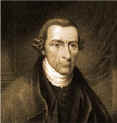
"Is life so dear, or peace so sweet, as to be
purchased at the price of chains and slavery? Forbid it, Almighty God! - I know
not what course others may take; but as for me, give me liberty or give me
death!"
Patrick Henry
(1736-1799)
"Guard with jealous attention the public liberty.
Suspect everyone who approaches that jewel. Unfortunately, nothing will
preserve it but downright force. When you give up that force, you are
ruined."
Patrick Henry (1736-1799), Virginia's U.S. Constitution
Ratification Convention
"Have we the means of resisting disciplined armies, when
our only defense, the militia is put in the hands of Congress?"
Patrick Henry (1736-1799), 3 Elliot Debates 48.
"They tell us that we are weak—unable to cope with so formidable an
adversary. But when shall we be stronger? Will it be when we are totally
disarmed, and when a British guard shall be stationed in every house? Three
million people, armed in the holy cause of liberty, are invincible by any force
which our enemy can send against us."
Patrick Henry (1736-1799), 1775
Webmaster's
Note: It is interesting to note that the population in 1775, was
approximately 2.9 million. In Patrick Henry's above quotation, he refers
to ALL THE PEOPLE, and NOT just those meeting the qualifications of service in
the Militia.
"The great object is that every man be armed.
Everyone who is able may have a gun."
Patrick Henry
"O sir, we
should have fine times, indeed, if, to punish tyrants, it were only
sufficient to assemble the people! Your arms, wherewith you could defend
yourselves, are gone... Did you ever read of any revolution in a nation...
inflicted by those who had no power at all?"
Patrick Henry, Elliot p.
3:50-53, in Virginia Ratifying Convention
"Are we at least brought to such a humiliating and
debasing degradation, that we cannot be trusted with arms for our own defense?
Where is the difference between having our arms in our possession and under our
own direction, and having them under the management of Congress? If our defense
be the real object of having those arms, in whose hands can they be trusted with
more propriety, or equal safety to us, as in our own hands?"
Patrick Henry,
3 Elliot Debates 168-169.
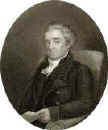
Noah Webster American Patriot (1758-1843) (Author of
America's first dictionary)
"Another source of power in government is a military force.
But this, to be efficient, must be superior to any force that exists among the people, or which they can command; for otherwise this force would be annihilated, on the first exercise of acts of oppression.
Before a standing army can rule, the people must be disarmed; as they are in almost every kingdom in Europe.
The supreme power in America cannot enforce unjust laws by the sword; because the whole body of the people are armed, and constitute a force superior to any band of regular troops that can be, on any pretense, raised in the United States.
A military force, at the command of Congress, can execute no laws, but such as the people perceive to be just and constitutional; for they will possess the power, and jealousy will instantly inspire the inclination, to resist the execution of a law which appears to them unjust and oppressive."
Noah Webster (1758-1843)
American patriot and scholar, author of the 1806 edition of the dictionary that
bears his name, the first dictionary of American English usage.
Defined the militia similarly as "the effective part of the people at
large."
Source: An Examination of the Leading Principles of the Federal Constitution,
Philadelphia, 1787

Tench Coxe (Alexander Hamilton's Chief Assistant in the Treasury
Department)
"As civil rulers, not having their duty to the people duly before them, may attempt to tyrannize, and as the military forces which must be occasionally raised to defend our country, might pervert their power to the injury of their fellow citizens, the people are confirmed by the next article in their right to keep and bear their private arms."
Tench Coxe (1755-1824), writing as
"A Pennsylvanian," in "Remarks On The First Part Of The
Amendments To The Federal Constitution," in the _Philadelphia Federal
Gazette,_ June 18, 1789, p.2 col.1
"The power of the sword, say the minority of
Pennsylvania, is in the hands of Congress. My friends and countrymen, it is not
so, for the powers of the sword are in the hands of the yeomanry of America from
16 to 60. The militia of these free commonwealths, entitled and accustomed to
their arms, when compared with any possible army, must be tremendous and
irresistible. Who are the militia? Are they not ourselves? It is feared, then,
that we shall turn our arms each man against his own bosom? Congress has no
power to disarm the militia. Their swords, and every other terrible implement of
the soldier, are the birthright of an American. The unlimited power of the sword
is not in the hands of either the federal or state governments, but where I
trust in God it will ever remain, in the hands of the people."
Tench Coxe
(1755-1824), writing as "the Pennsylvanian" in the Philadelphia Federal
Gazette, February 20, 1788
"Every free man has a right
to the use of the press, so he has to the use of his arms."
Tench Coxe (1755-1824)
"The militia, who are in fact the effective part of the
people at large, will render many troops quite unnecessary. They will form a
powerful check upon the regular troops, and will generally be sufficient to
over-awe them"
Tench Coxe (1755-1824), An American Citizen IV, October 21, 1787
Daniel
Webster (1782-1852) (Secretary of State under three U.S. Presidents)
"God
grants Liberty only to those who love it, and are always ready to guard
and defend it."
Daniel Webster (1782-1852)
in a speech on 3 June, 1834
"Good intentions will
always be pleaded for every assumption of authority. It is hardly
too strong to say that the Constitution was made to guard the people
against the dangers of good intentions. There are men in all ages
who mean to govern well, but they mean to govern. They promise to
be good masters, but they mean to be masters."
Daniel Webster (1782-1852)
Thomas
Paine (1737-1809)
"We fight not to enslave, but to set a country free, and to make
room upon the earth for honest men to live in."
Thomas Paine
"The supposed quietude
of a good man allures the ruffian; while on the other hand, arms like
laws, discourage and keep the invader and the plunderer in awe, and
preserve order in the world as well as property. The same balance
would be preserved were all the world destitute of arms, for all would
be alike; but since some will not, others dare not lay them
aside... Horrid mischief would ensue were one half the world
deprived of the use of them..."
Thomas Paine
(1737-1809)
Source: I Writings of Thomas Paine at 56, 1894
"...[A]rms discourage and keep the invader and plunderer in
awe, and preserve order in the world as well as property...Horrid mischief would ensue
were the law-abiding deprived of the use of
them."
Thomas Paine (1737-1809), Thoughts
On Defensive War, 1775
"The balance of power is the scale of peace. The same balance would be preserved were all the world not destitute of arms, for all would be alike; but since some will not, others dare not lay them aside ... Horrid mischief would ensue were one half the world deprived of the use of them ... the weak will become prey to the strong."
Thomas Paine (1737-1809)
"...if a thief breaks into my house, burns and destroys my
property, and kills or threatens to kill me, or those that are in it, and to 'bind me in all cases whatsoever' to his absolute will,
am I to suffer it?"
Thomas Paine (1737-1809)
"I am thus far a Quaker, that I would gladly argue with all the world to lay aside the use of arms and settle matters by negotiation, but unless the whole will, the matter ends, and I take up my musket and thank Heaven He has put it in my power."
Thomas Paine (1737-1809)
Source:
Writings of Thomas Paine at 56 (M. Conway ed. 1894)
Massachusetts Representative Elbridge Gerry (1744-1814)
"Whenever governments mean to invade the rights and
liberties of the people, they always attempt to destroy the militia, in order to
raise an army upon their ruins."
Rep. Elbridge Gerry of Massachusetts
Debate, U.S. House of Representatives, August 17, 1789; spoken during
floor debate over the Second Amendment, I Annals of Congress at 750
"I ask what is the purpose of the militia? To offset the need of large standing armies, the bane of liberty."
Rep. Elbridge Gerry of Massachusetts
Debate, U.S. House of Representatives, August 17, 1789; spoken during
floor debate over the Second Amendment, I Annals of Congress at 750
"Self defense is a primary law of
nature, which no subsequent law of society can abolish; the immediate gift of the Creator, obliges everyone … to resist
the first approaches of tyranny."
Elbridge Gerry (1744-1814)
5th Vice President under Madison, Massachusetts Governor, U.S. House Rep
and U.S. Senator. (Probably one of the most important men you've
never heard of)
"Such are
a well regulated militia, composed of the freeholders, citizen and
husbandman, who take up arms to preserve their property, as individuals,
and their rights as freemen."
"M.T.
Cicero" 1788
"The right of self-defense is the first law of nature; in most governments it has been the study of rulers to confine this right within the narrowest limits possible. Wherever standing armies are kept up, and when the right of the people to keep and bear arms is, under any color or pretext whatsoever, prohibited, liberty, if not already annihilated, is on the brink of destruction."
Blackstone's 1768 "Commentaries on the Laws of
England"
"And, lastly, to
vindicate these rights, when actually violated and attacked, the subjects of
England are entitled, in the first place, to the regular administration and free
course of justice in the courts of law; next to the right of petitioning the
king and parliament for redress of grievances; and, lastly, to the right of
having and using arms for self preservation and defense."
Sir William Blackstone (1723-1780)
Source: Commentaries on the Laws of England (Clarendon Press: Oxford, 17th
edition, 1966, Vol. 1., Chap.1).
"The congress of
the United States possesses no power to regulate, or interfere with the domestic
concerns, or police of any state: it belongs not to them to establish any rules
respecting the rights of property; nor will the constitution permit any
prohibition of arms to the people."
Saint George Tucker (1752-1827)
Lawyer, Judge and Professor On Blackstone's Commentaries (1803), Volume 1,
Appendix, Note D
"This [Second
Amendment] may be considered as the true palladium of liberty.... The right of
self defence is the first law of nature: in most governments it has been the
study of rulers to confine this right within the narrowest limits possible.
Wherever standing armies are kept up, and the right of the people to keep and
bear arms is, under any colour or pretext whatsoever, prohibited, liberty, if
not already annihilated, is on the brink of destruction. In England, the people
have been disarmed, generally, under the specious pretext of preserving the
game: a never failing lure to bring over the landed aristocracy to support any
measure, under that mask, though calculated for very different purposes. True it
is, their bill of rights seems at first view to counteract this policy: but the
right of bearing arms is confined to protestants, and the words suitable to
their condition and degree, have been interpreted to authorise the prohibition
of keeping a gun or other engine for the destruction of game, to any farmer, or
inferior tradesman, or other person not qualified to kill game. So that not one
man in five hundred can keep a gun in his house without being subject to a
penalty."
Saint George Tucker, Blackstone's
Commentaries (1803), Volume 1, Appendix, Note D [Section 12: Restraints on
Powers of Congress.]
"The right of a citizen to keep and bear arms has justly been considered the palladium of the liberties of the republic, since it offers a strong moral check against the usurpation and arbitrary power of rulers, and will generally, even if these are successful in the first instance, enable the people to resist and triumph over them."
Joseph Story (1779-1845) U.S. Supreme Court Justice 1811-1845. His Dad was one of the Sons of Liberty who took part in the Boston Tea Party and fought at Lexington & Concord
in 1775. The above quote was from 1833
"No man can well doubt the propriety of placing a president of the United States under the most solemn obligations to preserve, protect, and defend the
constitution."
Joseph Story (1779-1845) U.S. Supreme Court Justice 1811-1845. His Dad was one of the Sons of Liberty who took part in the Boston Tea Party and fought at Lexington & Concord
"The importance of this article [the Second Amendment] will scarcely be doubted by any persons, who have duly reflected upon the subject. The militia is the natural defence of a free country against sudden foreign invasions, domestic insurrections, and domestic usurpations of power by rulers."
Joseph Story
(1779-1845) U.S. Supreme Court Justice, appointed by James Madison in 1811
"The people never give up their liberties but under some
delusion."
Edmund Burke (1729-1797) - English statesman
Speech at county meeting of Buckinghamshire, 1784
"The true danger is when liberty is nibbled away, for expedience, and by parts."
Edmund Burke (1729-1797) - English statesman
Letter, April 3, 1777, to the Sheriffs of
Bristol
"When bad men combine, the good must associate else they will fall one by one, an unpitied sacrifice in a contemptible struggle."
Edmund Burke (1729-1797) - English statesman
"The whole of the Bill [of
Rights] is a declaration of the right of the people at large or considered as
individuals... It establishes some rights of the individual as unalienable and
which consequently, no majority has a right to deprive them of."
Albert Gallatin (1761-1849)
Congressman, Treasury Secretary, House Majority Leader, quote from Oct 7, 1789
"The
danger (where there is any) from armed citizens, is only to the
'government', not to 'society'; and as long as they have nothing to
revenge in the government (which they cannot have while it is in their own
hands) there are many advantages in their being accustomed to the use of
arms, and no possible disadvantage."
Joel Barlow, Advice to
the Privileged Orders, 1792-93
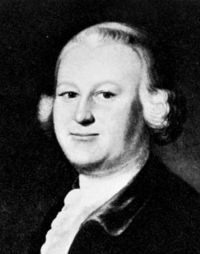 James Otis
(1725-1783) James Otis
(1725-1783)
"An act against the Constitution is void. An act
against natural equity is void."
James Otis (1725-1783)
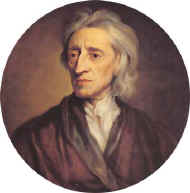 John Locke
(1632-1704) John Locke
(1632-1704)
"A man with a sword in his hand demands my purse in the high-way, when
perhaps I have not twelve pence in my pocket: this man I may lawfully kill."
John Locke (1632-1704) English philosopher and political theorist. Considered the ideological progenitor of the
American Revolution and who, by far, was the most often non-biblical writer quoted by the Founding Fathers of the
USA.
Source: "An Essay Concerning the True Original Extent and End of Civil Government", Chapter 18 "Of Tyranny",
#207, originally published in England, 1690
"[W]henever the Legislators endeavor to take away, and destroy the Property of the People, or to reduce them to Slavery under Arbitrary Power, they put themselves into a state of War with the People, who are thereupon absolved from any farther Obedience, and are left to the common Refuge, which God hath provided for all Men, against Force and Violence. Whensoever therefore the Legislative shall transgress this fundamental Rule of Society; and either by Ambition, Fear, Folly or Corruption, endeavor to grasp themselves, or put into the hands of any other an Absolute Power over the Lives, Liberties, and Estates of the People; By this breach of Trust they forfeit the Power, the People had put into their hands, for quite contrary ends, and it devolves to the people, who have a Right to resume their original Liberty and, by the Establishment of a new Legislative (such as they shall think fit) provide for their own Safety and Security, which is the end for which they are in Society."
John Locke (1632-1704) English philosopher and political theorist. Considered the ideological progenitor of the American Revolution and who, by far, was the most often non-biblical writer quoted by the Founding Fathers of the USA.
Source: Second Treatise of Civil Government [1690], #222 (Lasslet Edition, Cambridge University Press, 1960), p. 460-461; French translation by David Mazel (1691): Traité de gouvernement civil (Paris: Garnier-Flammarion, 1984), pp. 348-349
"[The disarming
of citizens] has a double effect, it palsies the hand and brutalizes the mind: a
habitual disuse of physical forces totally destroys the moral [force]; and men
lose at once the power of protecting themselves, and of discerning the cause of
their oppression."
Joel Barlow
(1754-1812) Politician and Poet, Advice to the Privileged Orders in the
Several States of Europe: Resulting From the Necessity and Propriety of a
General Revolution in the Principle of Government (London, 1792, 1795 and
reprint 1956).
"The danger
(where there is any) from armed citizens, is only to the government, not to the
society; as long as they have nothing to revenge in the government (which they
cannot have while it is in their own hands) there are many advantages in their
being accustomed to the use of arms and no possible disadvantage."
Joel Barlow (1754-1812)
Politician and Poet, Advice to the Privileged Orders in the Several States of
Europe: Resulting From the Necessity and Propriety of a General Revolution in
the Principle of Government (London, 1792, 1795 and reprint 1956).
"If I were an American, as I am an Englishman, while a
foreign troop was landed in my country, I would never lay down my arms never,
never, never! You cannot conquer
America."
William Pitt,
Speech, November 18, 1777
"Necessity is the plea for every infringement of Human freedom.
It is the argument of tyrants; it is the creed of slaves."
William Pitt - British House of Commons during the Revolutionary War and sympathetic to Colonial America, November 18, 1783
"The rights of
conscience, of bearing arms, of changing the government, are declared to be
inherent in the people."
Fisher Ames (1758-1808), U.S.
House Rep of Massachusetts Letter to F.R. Minoe, June
12, 1789
"All persons shall bear arms, and every male
person shall have in continual readiness a good musket or other gun, fit for
service."
Connecticut Gun Code of 1650
"The right of the people to keep and bear arms has been recognized by the General Government; but the best security of that right after all is, the military spirit, that taste for martial exercises, which has always distinguished the free citizens of these States....Such men form the best barrier to the liberties of America"
Gazette of the United States October
14, 1789
"To preserve liberty it is essential that the whole body of
the people always possess arms, and be taught alike, especially when young, how
to use them..."
Richard Henry Lee (1732-1794), Additional
Letters From The Federal Farmer, 1788
"A militia, when
properly formed, are in fact the people themselves...and include all men
capable of bearing arms."
Richard Henry Lee (1732-1794)
Founding Father
Source: Additional Letters from the Federal Farmer (1788) at p. 169
"No free government was ever founded, or ever preserved its liberty, without uniting the characters of the citizen and soldier in those destined for the defense of the state...such
are a well-regulated militia, composed of the freeholders, citizen and husbandman, who take up arms to preserve their property, as individuals, and their rights as freemen."
Richard Henry Lee (1732-1894), State Gazette (Charleston), September 8, 1788
"The
constitution ought to secure a genuine militia and guard against a select
militia. ....all regulations tending to render this general militia
useless and defenseless, by establishing select corps of militia, or
distinct bodies of military men, not having permanent interests and
attachments to the community ought to be avoided."
Richard Henry Lee
(1732-1794)
False is the idea of utility that sacrifices a thousand real advantages for one imaginary or trifling inconvenience; that would take fire from men because it burns, and water because one may drown in it; that has no remedy for evils, except destruction. The laws that forbid the carrying of arms are laws of such a nature. They disarm those only who are neither inclined nor determined to commit crimes. Can it be supposed that those who have the courage to violate the most sacred laws of humanity, the most important of the code, will respect the less important and arbitrary ones, which can be violated with ease and impunity, and which, if so dear to the enlightened legislator — and subject innocent persons to all the vexations that the guilty alone ought to suffer? Such laws make things worse for the assaulted and better for the assailants; they serve rather to encourage than to prevent homicides, for an unarmed man may be attacked with greater confidence than an armed man. They ought to be designated as laws not preventive but fearful of crimes, produced by the tumultuous impression of a few isolated facts, and not by thoughtful consideration of the inconveniences and advantages of a universal decree.
Cesare Beccaria
(1735-1794) [Bonesana, Marchese di] Italian nobleman, criminologist, and penal
reformer
Source: Dei delitti e delle pene, [On Crimes and Punishments] ch.38 (1764)
Translation is as quoted by Thomas Jefferson in his _Commonplace Book_, 314 (G.
Chinard ed. 1926), which was "the source book and repertory of Jefferson's
ideas on government." Id. at 4.
"While the people have property, arms in their hands, and only a spark of noble spirit, the most corrupt Congress must be mad to form any project of tyranny."
Rev. Nicholas Collin, Fayetteville Gazette (N.C.), October 12, 1789
Episcopal pastor, friend of Benjamin Franklin
"Instances of the licentious and outrageous behavior of the military conservators of the peace still multiply upon us, some of which are of such nature and have been carried to so great lengths as must serve fully to evince that a late vote of this town, calling upon the inhabitants to provide themselves with arms for their defense, was a measure as prudent as it was legal. It is a natural right which the people have reserved to themselves, confirmed by the [English] Bill of Rights, to keep arms for their own defense, and as Mr. Blackstone observes it is to be made use of when the sanctions of society and law are found insufficient to restrain the violence of oppression."
From "A Journal of the Times", calling the citizens of Boston to arm themselves in response to British abuses of power, 1769
"No free government was ever founded or ever preserved its liberty, without uniting the characters of the citizen and soldier in those destined for the defense of the state.... Such are a well regulated militia, composed of the freeholders, citizen and husbandman, who take up arms to preserve their property, as individuals, and their rights as freemen."
State Gazette (Charleston), September 8, 1788
"It's the misfortune of all Countries,
that they sometimes lie under a unhappy necessity to defend themselves by Arms
against the ambition of their Governors, and to fight for what's their own.
If those in government are heedless of reason, the people must patiently submit to Bondage,
or stand upon their own Defence; which if they are enabled to do, they shall never be put upon it,
but their Swords may grow rusty in their hands; for that Nation is surest to live in Peace,
that is most capable of making War; and a Man that hath a Sword by his side,
shall have least occasion to make use of it."
John Trenchard (1662-1723)
Source: and Walter Moyle (1672-1721), "An Argument, shewing; that a standing Army is Inconsistent with
a Free Government and Absolutely Destructive to the Constitution of the English Monarchy," (London, 1697)
"Those, who have the command of the arms in a country are masters of the state, and have it in their power to make what revolutions they please. [Thus,] there is no end to observations on the difference between the measures likely to be pursued by a minister backed by a standing army, and those of a court awed by the fear of an armed people."
John Trenchard (1662-1723)
Source: and Walter Moyle (1672-1721), "An Argument, shewing; that a standing Army is Inconsistent with
a Free Government and Absolutely Destructive to the Constitution of the English Monarchy," (London, 1697)
"Under
every government the dernier [Fr. last, or final] resort of the people, is
an appeal to the sword; whether to defend themselves against the open
attacks of a foreign enemy, or to check the insidious encroachments of
domestic foes. Whenever a people... entrust the defence of their
country to a regular, standing army, composed of mercenaries, the power of
that country will remain under the direction of the most wealthy
citizens."
A Framer Anonymous 'framer' of
the US Constitution Source: Independent Gazetteer, January 29, 1791
"No
kingdom can be secured otherwise than by arming the people. The possession
of arms is the distinction between a freeman and a slave. He, who has
nothing, and who himself belongs to another, must be defended by him,
whose property he is, and needs no arms. But he, who thinks he is his own
master, and has what he can call his own, ought to have arms to defend
himself, and what he possesses; else he lives precariously, and at
discretion."
James Burgh (1714-1775)
was an English Whig politician
Source: "Political Disquisitions: Or, an Enquiry into Public Errors,
Defects, and Abuses" (London, 1774-1775)
"The
people are not to be disarmed of their weapons. They are left in
full possession of them."
Zachariah Johnson
Source: June 25, 1788, Virginia Constitutional Ratification
Convention. Debates in the Several State Conventions on the Adoption
of the Federal
Constitution, Jonathan Elliot, ed., v.3 p.646 (Philadelphia, 1836)
"The
prohibition is general. No clause in the Constitution could by any rule of
construction be conceived to give to congress a power to disarm the
people. Such a flagitious attempt could only be made under some general
pretence by a state legislature. But if in any blind pursuit of inordinate
power, either should attempt it, this amendment (Second Amendment) may be
appealed to as a restraint on both."
William Rawle (1759-1836)
American Lawyer Mr. Rawle had been asked several times by George Washington to serve as
United States Attorney General
Source: commenting on the Second Amendment, A VIEW OF THE CONSTITUTION OF THE UNITED STATES 125-26, 1829 (2nd ed.) reprinted in THE FOUNDERS’ CONSTITUTION Volume Five (Amendments I-XII) p. 214 (Univ. of Chicago Press).
"A man
cannot lay down the right of resisting them that assault him by force, to
take away his life."
Thomas Hobbes in The Leviathan,
1651
"For we
may not think ever to keep that people in subjection which hath always
lived in liberty, if they be not disarmed."
Jean Bodin (1530-1596)
French Jurist and Political Philosopher, in Six Books of a Commonweale,
1606 AD (R. Knolles translation, pg. 615, 1606)
"Some
princes, so as to hold securely the state, have disarmed their
subjects.... But when you disarm them, you commence to offend them and
show that you distrust them either through cowardice or lack of
confidence, and both of these opinions generate hatred against you. And
because the government cannot remain unarmed, it follows that the
government turns to hired police. Therefore a wise prince has always
distributed arms to the general population."
Nicolo Machiavelli (1469-1527)
Philosopher, Politician and Writer, The Prince, Chapter 20 (L. Ricci
translation, pg. 105, 1952)
"The
possession of arms is the distinction between a freeman and a slave. He
who has nothing, and belongs to another, must be defended by him, and
needs no arms: but he who thinks he is his own master, and has anything he
may call his own, ought to have arms to defend himself and what he
possesses, or else he lives precariously and at discretion. And though for
a while those who have the sword in their power abstain from doing him
injury; yet, by degrees, he will be awed into submission to every
arbitrary command. Our ancestors, by being always armed, and frequently in
action, defended themselves against the Romans, Danes and English; and
maintained their liberty against encroachments of their own princes."
Andrew Fletcher (1653-1716)
Scottish Writer and Politician in A Discourse of Government with Relation
to Militias in Political Works 6, 1749 AD (London, 1798, pg. 221)
"Self-defense
is a part of the law of nature; nor can it be denied the community, even
against the king himself."
William Barclay
(1546-1608, Scottish jurist)
Other Quotes of
Interest
"Americans have the will to resist because you have weapons. If you don't have a gun, freedom of speech has no power."
Yoshimi Ishikawa, Japanese author commenting on the lack of protest with which Japanese tolerated governmental corruption, Los Angeles Times, 10/15/92
"Among the many misdeeds of the British rule in India, history will look upon the act of depriving a whole nation of arms, as the blackest."
Mohandas Karamchand Gandhi
(1869-1948) Political and Spiritual Leader of India
"I do
believe that where there is a choice only between cowardice and violence,
I would advise violence."
Mohandas Karamchand Gandhi
(1869-1948) Political and Spiritual Leader of India
"Germans who wish to use firearms should join the SS or the SA - ordinary citizens don't need guns, as their having guns doesn't serve the State."
Heinrich Himmler (1900-1945)
Adolph Hitler's head of the SS in Nazi Germany
"The Constitution is not neutral.
It was designed to take the government off the backs of people."
Justice William O. Douglas
(1898-1980), U. S. Supreme Court Justice
Source: The Court Years, 1939-1975, 1980
"The framers of
the Constitution employed words in their natural sense; and, where they are
plain and clear, resort to collateral aids to interpretation as unnecessary, and
cannot be indulged in to narrow or enlarge the text; but where there is
ambiguity or doubt, or where two views may well be entertained, contemporaneous
and subsequent practical construction is entitled to the greatest weight."
Justice Melville Weston Fuller
(1833-1910) Chief Justice of the United States Supreme Court, 1888-1910
Source: delivering the opinion of the court in MCPHERSON v. BLACKER, 146 U.S. 1
(1892)
"Never doubt that a small group of thoughtful committed citizens can change the world; indeed it's the only thing that ever has."
Margaret Mead (1901-1978), American Anthropologist
"Patriotism is not a short and frenzied outburst of emotion but the tranquil and steady dedication of a lifetime."
Adlai E.Stevenson, Jr
"Certainly one of the chief
guarantees of freedom under any government, no matter how popular and respected,
is the right of citizens to keep and bear arms. This is not to say that firearms
should not be very carefully used and that definite safety rules of precaution
should not be taught and enforced. But the right of citizens to bear arms is
just one more guarantee against arbitrary government, one more safeguard against
a tyranny which now appears remote in America, but which historically has proved
to be always possible."
Sen. Hubert Humphrey, Know Your
Lawmakers, Guns, Feb. 1960, p. 4
"...By calling attention to a well-regulated militia for the security of the Nation, and the right of each citizen to keep and bear arms, our founding fathers recognized the essentially civilian nature of our economy. Although it is extremely unlikely that the fear of governmental tyranny, which gave rise to the Second Amendment, will ever be an important danger to our Nation, the Amendment remains an important declaration of our basic military-civilian relationship, in which every citizen must be ready to participate in the defense of his country. For that reason I believe the Second Amendment will always be important."
President John F. Kennedy
"If gun
laws in fact worked, the sponsors of this type of legislation should have
no difficulty drawing upon long lists of examples of crime rates reduced
by such legislation. That they cannot do so after a century and a half of
trying -- that they must sweep under the rug the southern attempts at gun
control in the 1870-1910 period, the northeastern attempts in the
1920-1939 period, and the attempts at both Federal and State levels in
1965-1976 -- establishes the repeated, complete, and inevitable failure of
gun laws to control serious crime."
Senator Orrin Hatch, Chairman
of the Senate Subcomittee on the Constitution (The Making of America,
p.695)
"To
prohibit a citizen from wearing or carrying a war arm . . . is an
unwarranted restriction upon the constitutional right to keep and bear
arms. If cowardly and dishonorable men sometimes shoot unarmed men with
army pistols or guns, the evil must be prevented by the penitentiary and
gallows, and not by a general deprivation of a constitutional
privilege."
Arkansas Supreme Court
Wilson v. State, 33 Ark. 557, 560, 1878
"The right
of the citizens to bear arms in defense of themselves and the State shall
not be questioned. Because the ownership of firearms is constitutionally
protected, its regulation is a matter of statewide concern. The
constitution does not provide that the right to bear arms shall not be
questioned in any part of the commonwealth except Philadelphia and
Pittsburgh, where it may be abridged at will, but that it shall not be
questioned in any part of the commonwealth."
Supreme Court of Pennsylvania,
545 Pa. 279; 681 A.2d 152; 1996 Pa. Lexis 1447, May 1, 1996, Argued July
18, 1996, Decided.
"If guns
are outlawed, only the government will have guns. Only the police, the
secret police, the military, the hired servants of our rulers. Only the
government --and a few outlaws. I intend to be among the outlaws."
Edward Abbey (1927-1989)
American Author in Abbey's Road, p.39 (Plume, 1979)
"The tank,
the B-52, the fighter-bomber, the state controlled police and the military
are the weapons of dictatorship. The rifle is the weapon of democracy. Not
for nothing was the revolver called an 'equalizer.' Egalite implies
liberte. And always will. Let us hope our weapons are never needed --but
do not forget what the common people knew when they demanded the Bill of
Rights: An armed citizenry is the first defense, the best defense, and the
final defense against tyranny."
Edward Abbey (1927-1989)
American Author
"A fear of
weapons is a sign of retarded sexual and emotional maturity."
Sigmund Freud, General
Introduction to Psychoanalysis (1952)
"Today's
liberals wish to disarm us so they can run their evil and oppressive agenda on
us. The fight against crime is just a convenient excuse to further their agenda.
I don't know about you, but if you hear that Williams' guns have been taken,
you'll know Williams is dead."
Walter E. Williams (1936-
), Professor of Economics, George Mason University and Writer
"How we
burned in the prison camps later thinking: What would things have been
like if every police operative, when he went out at night to make an
arrest, had been uncertain whether he would return alive? If during
periods of mass arrests people had not simply sat there in their lairs,
paling with terror at every bang of the downstairs door and at every step
on the staircase, but had understood they had nothing to lose and had
boldly set up in the downstairs hall an ambush of half a dozen people with
axes, hammers, pokers, or whatever was at hand? The organs would very
quickly have suffered a shortage of officers and, notwithstanding all of
Stalin's thirst, the cursed machine would have ground to a halt."
Alexander Solzhenitsyn
(1918-2008) Russian Novelist and Historian
"A system
of licensing and registration is the perfect device to deny gun ownership
to the bourgeoisie."
Vladimir Ilyich Lenin
(1870-1924) First leader of the U.S.S.R.
Please take a minute to compare and contrast the above quotes with the following ones:
First, listen to former U.S. President William Jefferson Clinton's comments on the Bill of Rights...
"When we got organized as a country and we wrote a fairly radical Constitution with a radical Bill of Rights, giving a radical amount of individual freedom to Americans. And so a lot of people say there's too much personal freedom. When personal freedom's being abused, you have to move to limit it. That's what we did in the announcement I made last weekend on the public housing projects, about how we're going to have weapon sweeps and more things like that to try to make people safer in their communities."
President William Jefferson Clinton 3-22-94
"If the personal freedoms guaranteed by the Constitution inhibit the
government's ability to govern the people, we should look to limit those guarantees."
William Jefferson Clinton, August 12, 1993
"The United States can't be so fixed on our desire to preserve the rights of
ordinary Americans..."
William Jefferson Clinton, March 1, 1993
"We can't be so fixated on our desire to preserve the rights of ordinary Americans ..."
President William Jefferson Clinton USA Today March 11, 1993
"You know the one thing that's wrong with this country? Everyone gets a chance to have their fair say."
President William Jefferson Clinton May 29, 1993
"The Constitution is a radical document... it is the job of the government to rein in people's rights."
President William Jefferson Clinton on MTV - 1992
"We must stop thinking of the individual and start thinking about what is best for society."
Hillary Clinton, First
Lady 1993
"Society's
needs come before the individual's needs."
Adolf Hitler (1889-1945) German
Nazi Dictator
When Hillary and Hitler
sound alike, it gets pretty scary, don't you think?The common good comes before the private good.
Nazi slogan
"The most foolish mistake we could possibly make would be to permit the conquered Eastern peoples to have arms. History teaches that all conquerors who have allowed their subject races to carry arms have prepared their own downfall by doing so."
Adolf Hitler (1889-1945), April 11, 1942, quoted in Hitlers Tischegesprache Im Fuhrerhauptquartier 1941-1942. [Hitler's Table-Talk at the Fuhrer's Headquarters 1941-1942], Dr. Henry Picker, ed. (Athenaum-Verlag, Bonn, 1951)
"We have to license and register all handguns."
Senator Hillary Clinton
We have to make sure you never even get nominated.
"The measures adopted to restore public order are: First of all the elimination of the so-called subversive elements.... They were elements of disorder and subversion. On the morrow of each conflict I gave the categorical order to confiscate the largest possible number of weapons of every sort and kind. This confiscation, which continues with the utmost energy, has given satisfactory results."
Italy’s Fascist ruler, Prime Minister Benito Mussolini, Italian Senate Speech, June 8, 1923
Fascism occurs where the wants and desires of government supercede those of the people.
"We're going to hammer guns on the anvil of relentless legislative strategy! We're going to beat guns into submission!"
U.S. Rep. Charles Schumer
Note: U.S. Rep. Schumer is now a U.S. Senator
"We don't compel in the Brady bill. We allow."
U.S. Rep. Charles Schumer CNN Crossfire, March 3, 1993
Oh really? I suppose the government allows free speech too?
"Banning guns is an idea whose time has come."
U.S. Senator Joe Biden
Fat chance Joe. Why is this guy still in the Senate?
"The pusher's best friend, the
N.R.A."
Senator Edward M. "Ted" Kennedy
Gee, Ted, I thought we were about safety, marksmanship and keeping your hands off our stuff?
"Once Brady is signed into law, we will have to go back and get this sunset [phaseout of the delay] undone."
U.S. Rep Charles Schumer Pittsburgh Post-Gazette, November 11, 1993
Chuck, we knew all along that Brady was the foot in the door, but America didn't believe us.
"You know, we're having trouble in the House. It's neck and neck on an assault weapons ban, which is a ban of the most obnoxious kinds of weapons that nobody uses."
U.S. Rep Charles Schumer Press conference introducing Brady II, February 28, 1994
Chuck, just because you fear paramilitary semi-autos doesn't mean we do...
"U.S. citizens may soon have to choose between civil liberties and more intrusive forms of protection."
Secretary of Defense William S. Cohen Remarks at the Adult Learning Center, New Brunswick, New Jersey, March 1, 1993
Mr. Cohen, we have a third choice, how about never allowing Democrats the majority again, what do you think about that?
Listen to another of our own United States Senators...
"If I could have gotten 51 votes in the Senate of the United States for an out right ban, picking up every one of them... "Mr. and Mrs. America, turn 'em all in, "I would have done it. I could not do that. The votes weren't here."
U.S. Senator Dianne Feinstein (D-CA), CBS-TV's "60 Minutes," 2/5/95 ; 8/1/99
Note: I find it interesting to note that the above Senator Dianne Feinstein has a concealed carry permit for a handgun in her home state of California.
"I will introduce legislation banning the sale manufacture or possession of hand-guns except in a few cases."
Senator J. Chafee, Minneapolis Star Tribune, June 15. 1992, pg. A13.
Hmmm, John, seems like your bill didn't quite make the grade...
Quotes from the media.
"Investigate the NRA with renewed vigor. Print names of those who take NRA funds. Support all causes the NRA opposes. The Times-Herald is right. The work a day guy doesn't envision total confiscation, but many with the real power to sway public opinion and effect change in America do."
T. Winship, Editor - Boston Globe, in Editor and Publisher Magazine, April 24, 1993, pg. 24
"It might be 50 years before the United States gets to where Britain is today. Passing a law like the assault weapon ban is a symbolic--purely symbolic--move in that direction. Its only real justification is not to reduce crime but to desensitize the public to the regulation of weapons in preparation for their ultimate confiscation."
Charles Krauthammer, Washington Post, April 5, 1996
"The only way to discourage the gun culture is to remove the guns from the hands and shoulders of people who are not in the law enforcement business."
New York Times, September 24, 1975
"There is no
reason for anyone in this country, anyone except a police officer or a military
person, to buy, to own, to have, to use a handgun. I used to think handguns
could be controlled by laws about registration, by laws requiring waiting
periods for purchasers, by laws making sellers check out the past of buyers. I
now think the only way to control handgun use in this country is to prohibit the
guns. And the only way to do that is to change the Constitution."
Michael Gartner former president of
NBC News
Source: Glut of Guns: What Can We Do About Them?, USA Today, Jan. 16, 1992, at
9A
The quote is often attributed to Bill Clinton while signing the Brady Bill in
1993.
"Gun violence won't be cured by one set of laws. It will require years of partial measures that will gradually tighten the requirements for gun ownership, and incrementally change expectations about the firepower that should be available to ordinary citizens."
New York Times, December 21, 1993
Ordinary citizens
huh? It's ordinary citizens who are in charge here bucko.
Remember a government for the people and by the people? This is not
a Communist country yet....
"We are inclined to think that every firearm in the hands of anyone who is not a law enforcement officer constitutes an incitement to violence. Let's come to our senses before the whole country starts shooting itself up on all its Main Streets in a delirious kind of High Noon."
Washington Post, August 19, 1965
"By a curiosity of evolution, every human skull harbors a prehistoric vestige: a reptilian brain. This atavism, like a hand grenade cushioned in the more civilized surrounding cortex, is the dark hive where many of mankind's primitive impulses originate. To go partners with that throwback, Americans have carried out of their own history another curiosity that evolution forgot to discard as the country changed from a sparsely populated, underpoliced agrarian society to a modern industrial civilization. That vestige is the gun -- most notoriously the handgun, an anachronistic tool still much in use."
Time, April 13, 1981
"We will never fully solve our nation's horrific problem of gun violence unless we ban the manufacture and sale of handguns and semi-automatic weapons."
USA Today
"Why should America adopt a policy of near-zero tolerance for private gun ownership? ...(W)ho can still argue compellingly that Americans can be trusted to handle guns safely?
We think the time has come for America to tell the truth about guns.
They are not for us. We cannot handle them."
Los Angeles Times
When the major media outlets have an agenda, and their news stories become slanted and biased, we all lose. At the very least, we should expect truthful reporting from the media at large. When biased reports arise, bogus statistics get used and one-sided polls are taken, we should all do our part to straighten them out.
Quotes From Anti-Gun Groups
"I'm convinced that we have to have Federal legislation to build on. We're going to have to take one step at a time, and the first step is necessarily--given the political realities--going to be very modest... Our ultimate goal--total control of handguns in the United States--is going to take time... The first problem is to slow down the increasing number of handguns being produced and sold in this country. The second problem is to get handguns registered, and the final problem is to make the possession of all handguns, and all handgun ammunition totally illegal."
Nelson T. Shields III, Founder of Handgun Control Incorporated (HCI)
"To me, the only reason for guns in civilian hands is for sporting purposes."
Sarah Brady Tampa Tribune, Oct 21, 1993
Sarah, I can see that you
don't know very much about American History do ya?
"...I don't believe gun owners have rights."
Sarah Brady, Hearst Newspapers Special Report, "Handguns in America" October 1997
So Sorry to disappoint you, but
you should try to learn a little about what you're talking about before
you open your trap.
"The NRA is bound and determined not to allow the Brady Bill to be enacted. And they're a fearsome opponent. They see this as `threshold' legislation. Because they realize if we get the Brady Bill to President Clinton and he signs it into law, then the door will be wide open for further gun control legislation. Of course, we hope that's true because, as you know, our campaign to enact a National Gun Policy to combat gun violence doesn't end with the Brady Bill - it just begins."
Sarah Brady HCI newsletter, Spring 1993
"It [the Brady Bill] is not a panacea. It's not going to stop crimes of passion or drug-related crime."
Sarah Brady Washingtonian Magazine, March 1991
It's not gonna stop anyone
inclined toward murder. Murderers don't obey laws...
Webmasters Note: Statistics show that the Brady Law has at best been ineffective as a deterrent to violent crime where a firearm is used. This fact is widely known, but I would not expect Dan Rather or Tom Brokaw to be trumpeting it on the Evening News.
The Brady Law has been ineffective because the Brady Law affects only those who obtain firearms through lawful channels. Criminals obtain their guns illegally, thereby bypassing the Brady Law.
And I'm not even a lawyer!!!
Winning Final Quote By Rosie O'Donnell
"I don't care if you think it's your right. I say: Sorry, it's 1999. We have had enough as a nation. You are not allowed to own a gun, and if you do own a gun I think you should go to prison."
Isn't "The Queen Of Nice", Simply Brilliant???
|

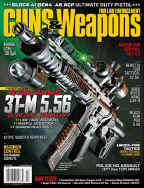


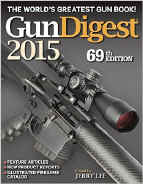
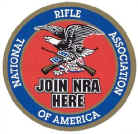
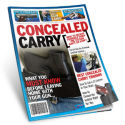














 James Otis
(1725-1783)
James Otis
(1725-1783) John Locke
(1632-1704)
John Locke
(1632-1704)